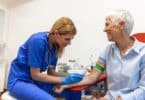
Giuliana found out that she had breast cancer after two rounds of IVF. Her fertility specialist had ordered a mammogram, despite the fact that she was only 36, before he would move forward with a third round of in vitro. According to Giuliana, she went, but not without a fight – “kicking and screaming” the whole way.
Breast cancer among women as young as Giuliana is rare, accounting for only about 5% of all breast cancer cases. The tumors, however, can often be more aggressive and more difficult to treat in younger women, so catching it early is crucial.
Currently, there are no set guidelines for mammogram testing. The U.S. Preventative Services Task Forces recommends that women start receiving regularly scheduled mammograms at the age of 50 but the American Cancer Society recommends that women start at the age of 40, unless they are at a high risk for breast cancer. Women with high risks should talk to their doctor about when to start regular testing.
Giuliana has no history of breast cancer in her family. She would have been considered low or average risk, at most. It is unclear why her specialist required the mammogram but it is obvious that it saved her life. Testing this early, however, is not recommended by other specialists.
Medical director at Georgia Reproductive Specialists, Dr. Mark Perloe, says that this line of testing is rather irregular and not standard procedure. In fact, he says that testing that early can cause unnecessary radiation exposure, a danger that is unwarranted if there is little risk of breast cancer.
“We certainly want people to have a full health evaluation before beginning fertility treatments but we wouldn’t recommend a mammogram unless there was a family history of breast cancer of genetic risk,” Perloe stated.
But what about the hormones found in fertilization treatments? Could that pose a risk? Experts say no. While there are hormones found in IVF therapy drugs – progesterone, estrogen, a follicle-stimulation hormone and luteinizing hormones – no link to IVF and breast cancer have ever been found. In fact, if anything, some experts say that IVF may actually help prevent certain female cancers, like breast cancer.
Adrian V. Lee, professor of pharmacology and chemical biology and director of the Women’s Cancer Research Center at the University of Pittsburgh’s Magee-Womens Research Institute stated,
“The largest study in Sweden – of 25,000 women who had IVF compared to 1.4 million without – showed a 25 percent reduction in breast cancer and a 40 percent reduction in cervical cancer in those who had IVF.”
Perloe stated that it is possible that the higher levels of estrogen and progesterone could accelerate tumor growth, but so could pregnancy.
“My concern is that this is going to cause a lot of people to be afraid. My advice to anyone who has concerns is to speak to their doctor and learn to do self-breast exams – and to check to see if anyone in their family had cancer before the age of 40,” he stated.
All women should know how to perform a breast exam and should perform them monthly. If you are unclear about how to perform a self-breast exam, you can talk to your doctor or find the information online. If you notice anything out of the ordinary, you should talk to your doctor immediately.
Related Articles:
- Study: Miscarriage Test Errors Leads to 400 Infant Deaths in UK
- Time for Sperm Donor Regulations in the U.S.?
- In-Vitro Fertilization Being Investigated for Possible Link to Autism






